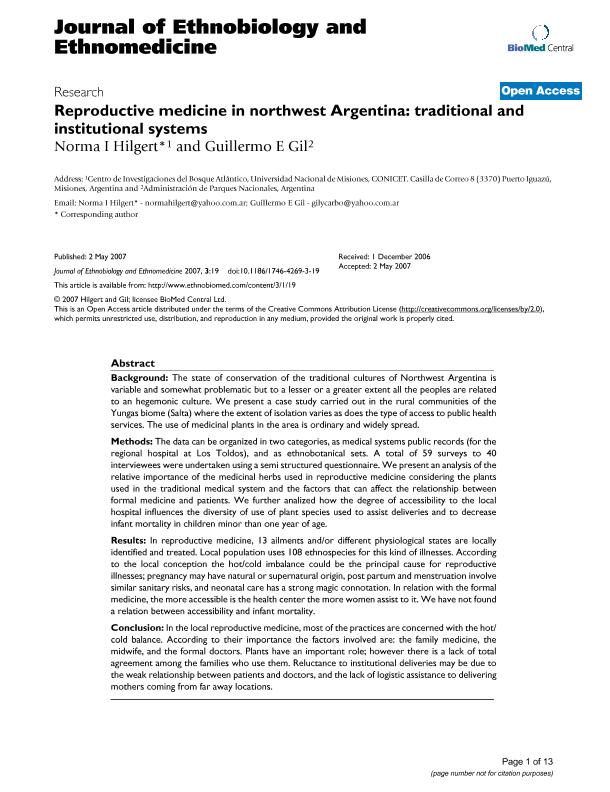Artículo
Reproductive medicine in northwest Argentina: Traditional and institutional systems
Fecha de publicación:
02/05/2007
Editorial:
BioMed Central
Revista:
Journal of Ethnobiology and Ethnomedicine
ISSN:
1746-4269
Idioma:
Inglés
Tipo de recurso:
Artículo publicado
Clasificación temática:
Resumen
Background: The state of conservation of the traditional cultures of Northwest Argentina is variable and somewhat problematic but to a lesser or a greater extent all the peoples are related to an hegemonic culture. We present a case study carried out in the rural communities of the Yungas biome (Salta) where the extent of isolation varies as does the type of access to public health services. The use of medicinal plants in the area is ordinary and widely spread. Methods: The data can be organized in two categories, as medical systems public records (for the regional hospital at Los Toldos), and as ethnobotanical sets. A total of 59 surveys to 40 interviewees were undertaken using a semi structured questionnaire. We present an analysis of the relative importance of the medicinal herbs used in reproductive medicine considering the plants used in the traditional medical system and the factors that can affect the relationship between formal medicine and patients. We further analized how the degree of accessibility to the local hospital influences the diversity of use of plant species used to assist deliveries and to decrease infant mortality in children minor than one year of age. Results: In reproductive medicine, 13 ailments and/or different physiological states are locally identified and treated. Local population uses 108 ethnospecies for this kind of illnesses. According to the local conception the hot/cold imbalance could be the principal cause for reproductive illnesses; pregnancy may have natural or supernatural origin, post partum and menstruation involve similar sanitary risks, and neonatal care has a strong magic connotation. In relation with the formal medicine, the more accessible is the health center the more women assist to it. We have not found a relation between accessibility and infant mortality. Conclusion: In the local reproductive medicine, most of the practices are concerned with the hot/cold balance. According to their importance the factors involved are: the family medicine, the midwife, and the formal doctors. Plants have an important role; however there is a lack of total agreement among the families who use them. Reluctance to institutional deliveries may be due to the weak relationship between patients and doctors, and the lack of logistic assistance to delivering mothers coming from far away locations.
Archivos asociados
Licencia
Identificadores
Colecciones
Articulos(CCT - NORDESTE)
Articulos de CTRO.CIENTIFICO TECNOL.CONICET - NORDESTE
Articulos de CTRO.CIENTIFICO TECNOL.CONICET - NORDESTE
Citación
Hilgert, Norma Ines; Gil, Guillermo E.; Reproductive medicine in northwest Argentina: Traditional and institutional systems; BioMed Central; Journal of Ethnobiology and Ethnomedicine; 3; 19; 2-5-2007; 1-13
Compartir
Altmétricas




